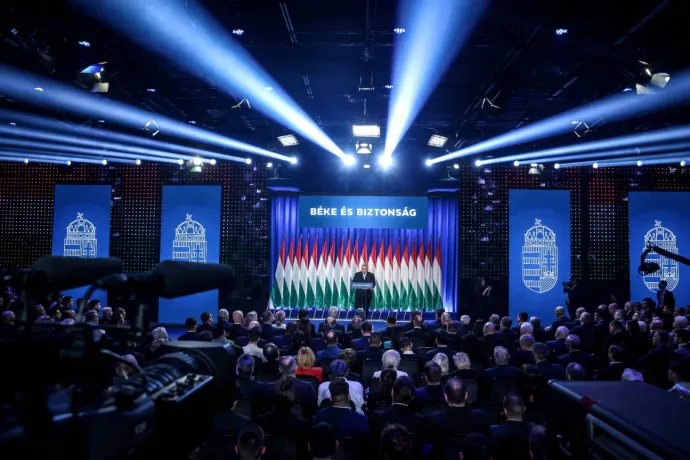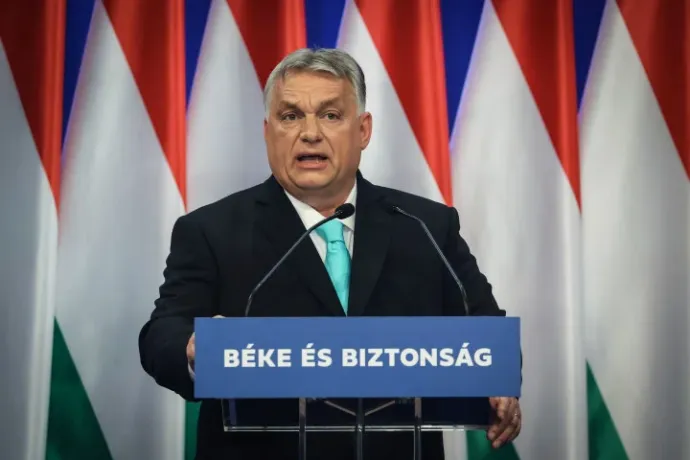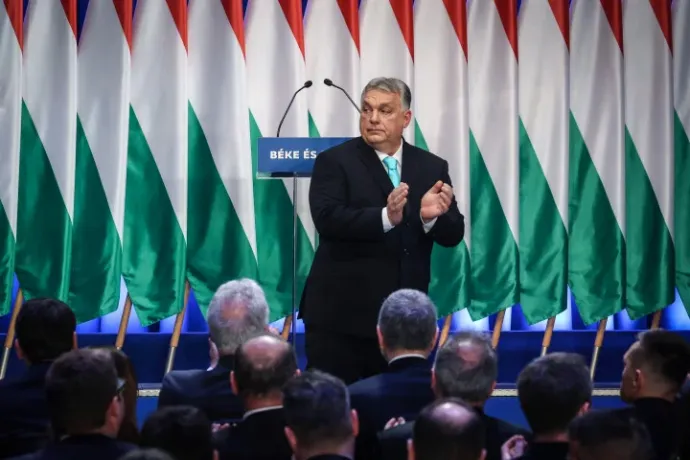Five strong sentences from Viktor Orbán's annual State of the Nation speech

In his previous annual speeches on the state of the nation, Orbán tended to present his more distant vision, outlining a general analysis and an outlook for the future. This time, however, there were several specific, emphatic sentences in the annual address. Let's look at each of the areas the Prime Minister touched on.
1. "The Hungarian Frank, our Feri, is now trying to round up the horses left without a rider" – Orbán on his opponents
Orbán's custom is always to highlight the threats to him, to the government, to Fidesz, and to the country, according to the current situation. In recent years, he has alternated the main adversaries: Brussels (during the campaign to cut the public utility bills), George Soros (during the migrant crisis), Ferenc Gyurcsány and the left (the eternal adversary). This time he named all his opponents in the speech as he listed the government's achievements over the past 13 years.
He listed at length that since 2010 "one million people have found jobs, the economy has tripled, and the minimum wage is higher than the average wage under the Socialists". In 2022, Fidesz won for the fourth time with a two-thirds majority, despite the fact that
"the whole left joined forces, even Brussels fought against us, and
Uncle George (i.e. George Soros) and his company rolled in 4 billion forints to give their comrades something to shoot at us with".
Orbán then recalled a scene from one of his favourite films, Once Upon a Time in the West, in which Harmonica confronts the three riders about the horses they have brought him. When it turns out that Frank hasn't sent anything, Harmonica replies that it's OK, there are still two horses left over. "The Hungarian Frank, our Feri, is now trying to round up the horses that were left without a rider", Orbán said unexpectedly, clearly referring to Ferenc Gyurcsány and the DK's strategy of devouring opposition parties.
Orbán named Brussels, Soros and Gyurcsány as his opponents, as well as the "gender propagandists". He referred to the case of a teacher's assistant who spoke on TikTok about his relationship with a 15-year-old student. "There is no excuse for paedophilia, children are sacred and untouchable," said Orbán, who added that in such situations it is not enough to have the government, parents and teachers are also needed. "Gender propaganda is not just some rainbow talk, it is a threat to our children," he said.
"We don't care that the world has gone mad and some people are indulging in disgusting fads, while Brussels explains the inexplicable", he said, adding that Hungary would introduce Europe's strictest child protection system but did not give any details for the time being.

2. "We will maintain economic relations with Russia, and we suggest the same to our allies" – Orbán on the war
Half of Orbán's speech, which lasted about an hour, was understandably about the war and his analysis of war strategies. Orbán reiterated Fidesz's slogans that " we must stay out of war" and that we need peace and a ceasefire.
But how do we defeat the threat of war? – he asked. "If we could have our way we would immediately put an end to it, but we don't have the strength to do it," he said, so the only choice we have is to stay out of the war. This will not be easy as a member of NATO and the EU because "everyone there is in favour of the war except us".
In addition to the usual familiar phrases, Orban also made some specific statements on the war and his actions:
- We will maintain economic relations with Russia, and we suggest the same to our allies.
- Orbán does not believe that Russia is a threat to Hungary's security. The war in Ukraine showed that Russia would not stand a chance against NATO. The whole world has seen that Russian forces are in no position to attack NATO. Hungary proposed the creation of a common European force a decade ago, and now we can see, according to Orbán, what a pity that it did not happen.
- Strategically, all the countries want the same thing: to have a sovereign Ukraine and for Russia not to be a threat to other countries. But while other countries want this to be achieved by continuing the war, Hungary wants it to be achieved by an immediate ceasefire.
- NATO membership is vital: but a coalition for war is not. "NATO is a defensive alliance, that's why we joined, that's why I felt the historic satisfaction of signing the application to join after 45 years of Soviet occupation". But NATO is not for member states to jointly attack a third country, if someone wants to commit an act of war, it must be done outside NATO, Orbán said.
- "Brusselites have not yet given their lives in this war, but Hungarians have", the Prime Minister said. According to him, those on the side of the war are far away from Ukraine, but we are here in the neighbourhood. While Hungarian symbols are being forcibly removed in Mukachevo, many Transcarpathian Hungarians are dying on the battlefield. " Have more respect for Hungarians in Mukachevo, Kyiv, Brussels and Washington".
- “Europe is experiencing moments of drifting into war, balancing on a thin line, in fact, it is already at indirect war with Russia”, because, for example, it is supplying weapons and training soldiers of one of the warring parties. According to Orban, “the danger of drifting into war has become permanent: it started with helmets, then came the transport of equipment incapable of killing people, fighter jets are already on the agenda, and we will soon hear about so-called peacekeeping troops.”
- "Peace will only come when the Americans and Russians negotiate with each other, and the later it happens, the higher the price we pay." He says further fighting will not bring victory, but more deaths, years of war, destruction and the threat of world war.
By referring to "so-called peacekeeping troops", Orbán seems to have been referring to contingents deployed on one side in the Korean or Gulf wars under UN mandate, but these troops were not peacekeepers in the name either. Peacekeeping troops only took their place among the belligerents after ceasefires suspended hostilities.
But even more important than the conceptual confusion is the Prime Minister's suggestion that the spiral of support is already at the point where some states are prepared to send combat troops to help Ukraine. NATO has not only steadfastly refused to send military units to Ukraine, but has even rejected Kyiv's request to establish a no-fly zone over the country to prevent Russian air strikes.
3. "Inflation is like a tiger, if you don't hit it, it will eat you up" – Orbán on inflation
"If we want to tackle inflation, we have to start with understanding", Orbán said addressing economic issues in the second half of his annual address. He said that Brussels had unleashed the problem, "the name of the disease is Brussels sanctions", although the effects of inflation had already been felt long before the war and the sanctions.
He said that the sanctions took 4000 billion forints out of the pockets of Hungarians, which is how much more companies, the state and the people spent on energy. Orbán said: "You just stand there in the glass palaces of Brussels and you can't believe what is going on. Instead of help from Brussels, there will only be more sanctions. He also said that it was because of bad intentions that the funds due to Hungary had not been granted.
According to Orbán the most important thing now is that
inflation "should not be seen as an inescapable scourge, it should not frighten us, we must act and we will see the results".
The government must intervene in the economy in this situation and maintain the various freezes that have been put in place.
The price freeze will remain until inflation is reduced, and the interest rate freeze will remain until interest rates fall. Now, the discounted county pass for public transport will be introduced: from 1 May it will cost 9450 HUF, while the public transport pass for the whole country will cost 18 900 HUF.
The prime minister said, without giving any specifics, that "inflation is like a tiger, if you don't hit it, it will eat you up". "Trust us, we'll hit it, we'll bring inflation down to single digits by the end of the year," he added.
4. "The windsock is already blowing in the wind" – Orbán on state expansion
Orbán also spoke at various points in his annual address about the main focuses and directions for development in the Hungarian economy. He stated that the reduction of utility bills will remain in place (although last year some of the discounts were withdrawn), the so-called '13th-month' bonus pension payment will also remain, and the aim is to bring the media sector and the telecommunications and information sector into Hungarian majority ownership – the latter referring to the acquisition of Vodafone. However, the Prime Minister said that they are not stopping there. He quoted the lines of the pop song ‘Airport’: “the windsock is already blowing in the wind” referring, obviously, to further acquisitions in the air industry.
Despite the obstacles of war and inflation, Orbán promised that unprecedented developments would be launched in the provinces and that we would provide more money than the provinces had ever seen even under the Austro-Hungarian monarchy. "The manufacturing and food industries will be revived, we will have national champions in the food industry who can compete on the world market, too".
The plan to modernise the eastern part of the country will also remain, "we will build bridges on the Danube": the bridge at Paks will be completed soon, and the one at Mohács will be built soon. Debrecen, Nyíregyháza and Miskolc are also developing their economic zones.
We will also build power plants and pipeline systems "even if Brussels refuses to play a part in this."
5. "Next time they will send someone called Puccini" – Orbán on humour
In Orbán's speeches, there are usually a few well-planned and well-placed jokes that the Prime Minister uses to both amuse his audience and emphasise his message. This State of the Nation address was no different.
He began his speech with the "Once Upon a Time in the West" analogy mentioned earlier, and later he poked fun at his EU opponents in Brussels by joking that "they are nitpicking the Hungarian rule of law while the patrol wagon is on constant duty at the European Union building" – a reference to the latest corruption scandal.

When Orbán divided Europe into pro-peace and pro-war, he used a witty simplification to show that he was alone in Europe with his policy: ‘we are left with two countries in favour of peace: Hungary and the Vatican’.
There was no shortage of jokes in the part of his speech about the US either. He joked about the names of the US ambassadors coming to Budapest, saying that Clinton had sent a good friend (André Goodfriend was Chargé d' Affaires during the expulsions) and now he had been replaced by one putting pressure on us (referring to David Pressman). Orbán said that "humour can help friendship through the hard times", but he hoped that next time "they won't send someone called Puccini", suggesting an intention in US politics to trigger some kind of putsch in Hungary.
For more quick, accurate and impartial news from and about Hungary, subscribe to the Telex English newsletter!